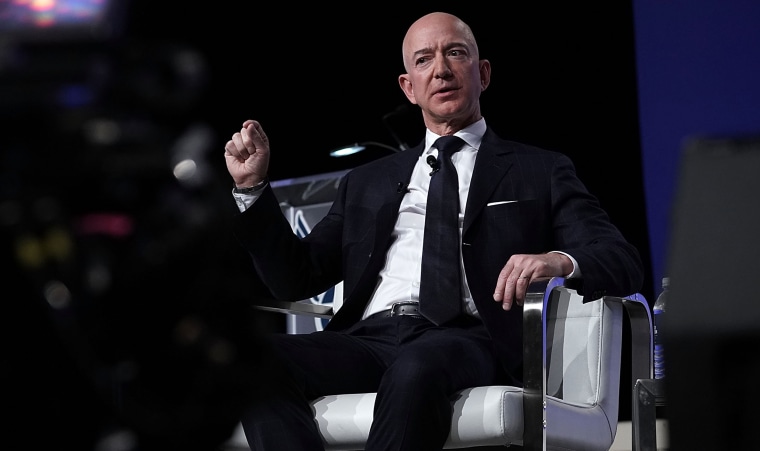Is Jeff Bezos a champion of journalistic integrity? Or an embarrassed selfie-taker looking to do damage control?
Bezos may be both, which wouldn’t be that unusual. And in the storied history of free-speech battles, he’s one of many protagonists who exercised questionable judgment in their sex or personal lives.
But the rights to free speech and freedom of the press have their limits in the U.S., and extortion is one of them.
Bezos on Thursday published a blog post in which he accused the National Enquirer’s parent company, American Media Inc., of attempting to get him to stop his personal investigation and The Washington Post’s reporting into how the tabloid acquired private messages and photos sent between him and a woman. In the emails Bezos said he received from AMI, the company said it would not publish the embarrassing photos if Bezos would say the company was not motivated by politics in its initial investigation of Bezos’ extramarital affair.
Invasive photos and tapes have been at the heart of several similar battles. Hulk Hogan’s famous lawsuit against the now-shuttered Gawker pitted journalistic freedom against individual privacy concerns, all arising from a sex tape featuring the former professional wrestler and his then-friend’s wife.
Plaintiffs like Hogan and potentially Bezos do not voluntarily wade into the fray or initiate the controversy to bring about change. They are only in this situation because of some bad personal choices. They probably would have preferred the whole thing remained private.
But Bezos’ situation immediately differs from Hogan’s in light of the demands that AMI allegedly made.
Extortion is a crime. In New York, from where the AMI offer was supposedly sent, extortion happens when one party compels or induces another to deliver property to himself or someone else by threatening that if the property is not delivered, the defendant will expose a secret or publicize an asserted fact, whether true or false, exposing the victim to ridicule; or do something calculated to harm another person materially in his business, career, financial condition, reputation or personal relationships. Fear of future economic harm is sufficient to establish extortion under the statute.
In California, where the AMI offer was received by Bezos’s attorney, Martin Singer, extortion is defined as obtaining anything of value, induced by a wrongful use of “fear.” That “fear” may be caused by a threat to disgrace someone or expose the person’s secrets.
If AMI sought only a favorable statement from Bezos or a cessation of negative coverage from the Washington Post, that could be “property” or “anything of value” used in the criminal statutes.
Any state or federal extortion statute has the potential to conflict with First Amendment, under which content-based restrictions on expression are presumed invalid. But AMI can’t claim that the protections of the First Amendment are absolute. The government may criminalize narrow categories of expression with so little truth or value that any benefit from them is clearly outweighed by the social interest in morality. Some speech can be criminalized based on its content, such as threats of violence or obscenity. Nude selfies likely don’t rise to the level of illegal obscenity, which must “turn you on and gross you out” at the same time, in the words of former Stanford Law School Dean Kathleen Sullivan.
If the government tries to outlaw speech outside of these undesirable categories, then the law is likely to be struck down.
But there is some precedent on AMI’s side. If a court can conclude that “revenge porn” does not fall within an established exception to full First Amendment protection, as in a 2016 Vermont case, then another might conclude that publishing naked selfies of the founder of Amazon is protected speech, immune from criminal or civil prosecution.
Ultimately, however, it’s hard for AMI to hide behind any claim of journalistic privilege if it threatened to reveal photos unless it secured favorable coverage by The Washington Post. Journalists don’t do that. Journalists call the subject of a story and tell them they are publishing a story one way or another, and invite comment by the subject. Journalists don’t call the subject of a story and offer not to publish if the subject does something that benefits them.
The law will always struggle to keep pace with technology. Attempts to penalize publication of embarrassing photos about newsworthy people will always pit privacy rights against free-speech protections.
In the end, while reasonable minds may differ as to whether this is civil or criminal extortion, AMI’s demand to Bezos for something of value to AMI makes it difficult for AMI claim this was a legitimate journalistic mission.
Danny Cevallos is an MSNBC legal analyst. Follow @CevallosLaw on Twitter.

